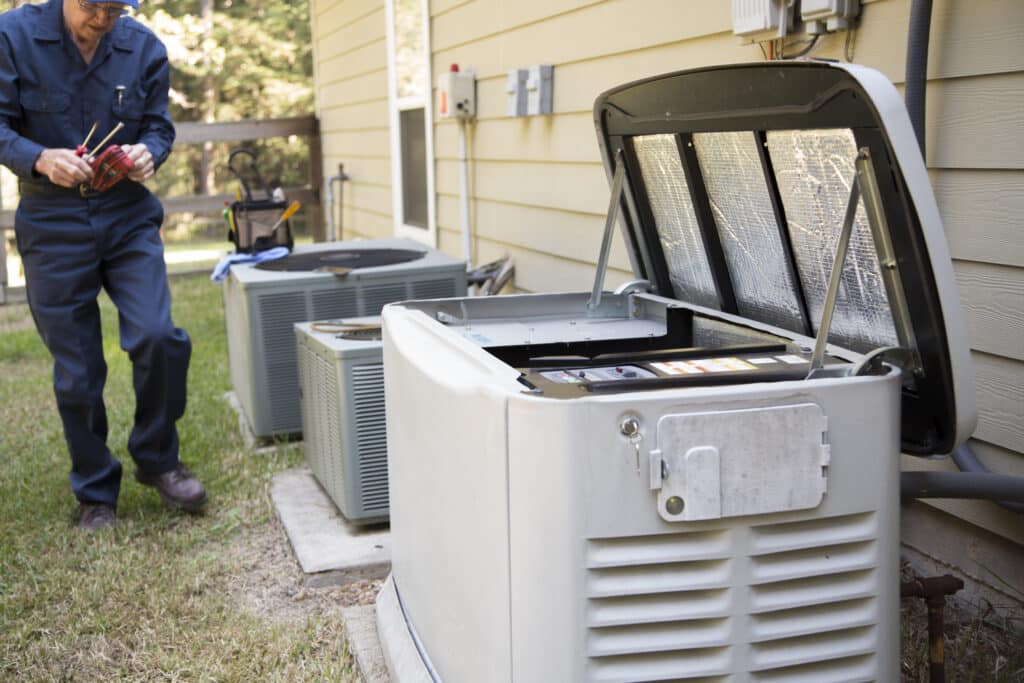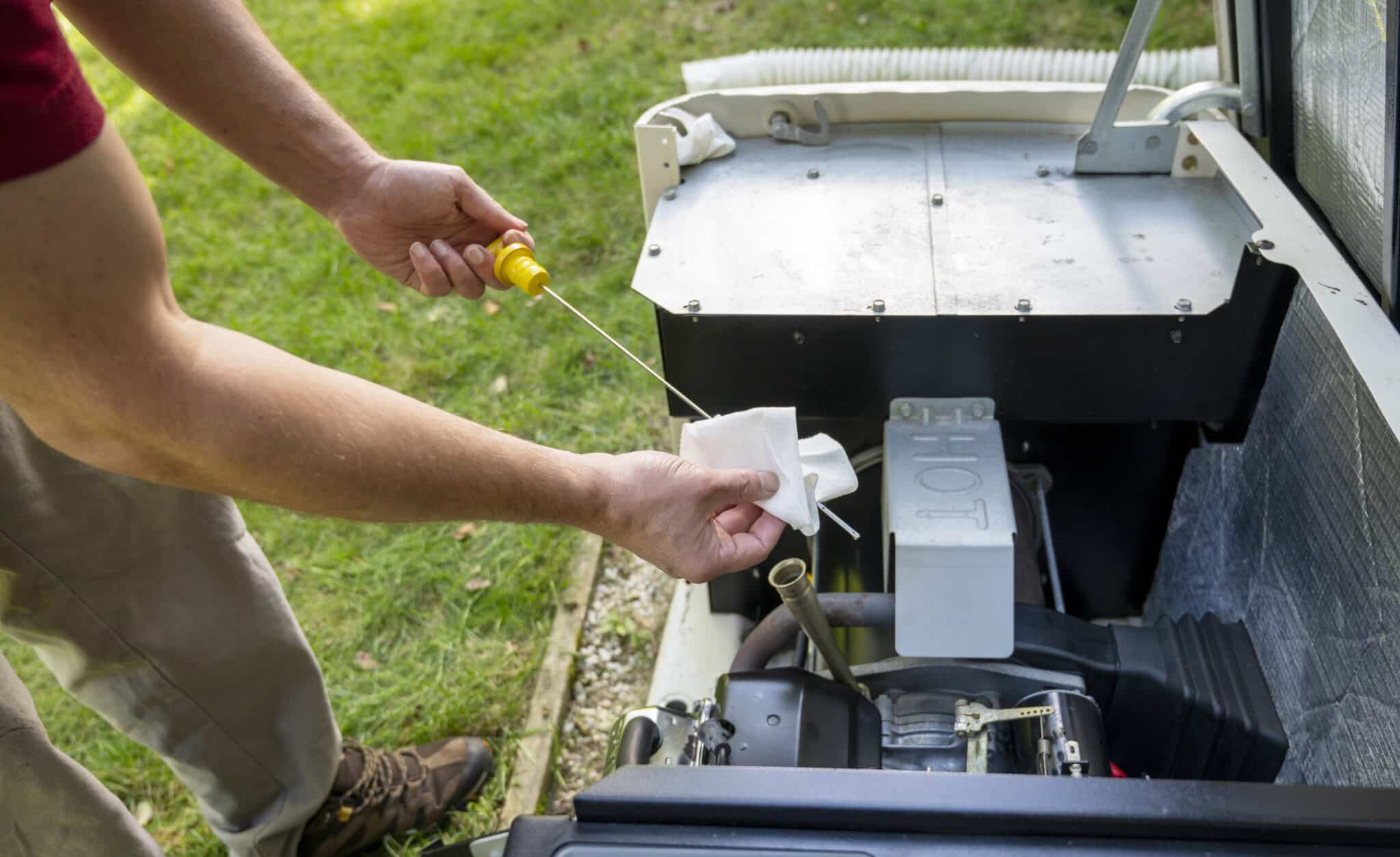
Maintenance Tips to Extend Generator Lifespan
Generator Lifespan – You can make your generator last longer by getting the right size, doing regular upkeep, and checking it often. Know what your working needs and the conditions are, and use good quality fluids to keep it running smoothly. Regular steps like load bank testing and steering clear of wet stacking are key for it to work well and last long.
Understanding Generator Lifespan
Ever thought about your generator’s lifespan and how long your generator can last?
Generator Lifespan depends a lot on its environment and how much you use it.
On average, big generators can run for 10,000 to 30,000 hours.
But tough climates and heavy use can cut that short.
A diesel generator, which combines a diesel engine with an electric generator, is used for backup power when there’s a power outage.
It can also help during peak times and support the grid.
However, how long it lasts isn’t just about what it does.
Picking the right diesel generator size is key to making it last longer.
This helps avoid running it too low or not having enough power.
Using new tools to figure out the right size based on where and how it will be used can make the generator work well and last longer.
Another important part is regular care, like making sure the voltage, frequency, and phase are in sync to prevent wear.
Routine check-ups stop small issues from becoming big problems, keeping your generator running smoothly.
Doing things like regular load tests and using good quality fluids helps extend generator lifespan, leading to better performance and peace of mind, whether you’re in Conway, SC or elsewhere.
Key Things That Affect Generator Lifespan
Ever wonder how using your generator too much affects its life?
It really matters.
Generators, like your coffee maker, aren’t made to run all the time.
Using them too much causes wear and tear, making engines age fast.
Using them too little is just as bad.
Not running them often leads to moisture buildup and battery issues, which can leave you stuck without power.
The weather in Conway, SC, also affects generator lifespan.
High humidity speeds up rust, and storms mean generators need to be ready, which can add wear.
It’s not just smart, but necessary to have a custom maintenance plan.
For example, regular load tests help avoid low-load problems and make sure your generator works when you need it.
Generators in places like Conway need good venting and covers to handle changing weather.
Regular checks and upkeep are key to a long generator lifespan and avoiding breakdowns.
Regular checks make sure everything’s working right.
Remember, taking good care of your generator isn’t optional; it’s crucial for staying powered in Conway’s unpredictable weather.
Proper Generator Sizing for Longevity and Understanding Generator Lifespan
Ever think about how picking the right generator size can make it last longer?
It’s not just about matching numbers; it’s about making sure it runs well and impacts generator lifespan positively.
In places like Conway, SC, experts know that not every home or business needs the same power.
A generator that’s too small works too hard, like a tiny engine pulling big loads, and this can wear it out fast, shortening its lifespan.
If it’s too big, it runs on low power, which isn’t good either and can cause issues like wet stacking.
So, how do you figure out the right size for what you need?
First, list all the stuff the generator will power.
Consider when you’ll use it most and which things need to stay on during outages.
Experts like Mister Sparky of Myrtle Beach, SC can help a lot with this.
They use advanced tools to tweak site conditions and load needs.
Regular load bank testing also helps ensure your generator is sized right and running well, which is crucial for extending generator lifespan.
Remember, spending time now to size it right can prevent a lot of stress and cost later—your generator will be happy!
Routine Maintenance Practices
Is your generator up for the long haul, or is it one step from breaking down?
Understanding generator lifespan and performing regular upkeep is key to making sure it runs well for a long time.
Start with a simple checklist: look at coolant levels, check the battery, and make sure all electrical connections are solid.
Keeping an eye on these helps fix small issues before they turn into big, costly repairs.
A set maintenance schedule is a must.
Think about setting up daily, weekly, and monthly checks.
Do things like look for fuel leaks each day, check battery terminals each week, and lube moving parts each month.
Sticking to a routine helps you catch problems early and extends generator lifespan by keeping wear and tear away.
In places like Conway, SC, where humidity can mess with machines, make sure your maintenance matches local conditions.
Use checklists that consider these factors and don’t skip sync tasks, like matching the generator’s voltage and frequency before adding it to your system.
Put effort into these tasks to keep your generator reliable and stable.
Keeping your generator in great shape isn’t just about maintenance; it’s an investment in peace of mind and efficiency, ultimately influencing generator lifespan.
Check Your Generator’s Oil Regularly

How often do you check your generator’s oil?
It’s a simple but key step to extend your generator lifespan and keep it running well.
Aim to check the oil every 100 hours of use or once a month, whichever comes first.
Oil is like the lifeblood of your generator, helping with lubrication and cooling.
Ignoring this can lead to big engine problems over time.
Watch for signs of oil trouble, like a burnt smell or dark color, which could mean the engine is too hot or the oil is dirty.
If the oil seems too thick, it might point to poor upkeep or usage issues.
Keeping an eye on oil levels and quality helps stop early wear and keeps your generator lifespan optimal, a point stressed by experts like those at Mister Sparky of Myrtle Beach.
Regular checks can prevent surprise breakdowns and save you money on repairs.
Whether you’re in Conway, SC, or elsewhere, grab that dipstick and take care of your generator.
It’s a simple task with a lot of benefits for maintaining a long generator lifespan.
Using Good Fluids
Ever think about how using good fluids can extend your generator’s lifespan?
Using top fluids is like giving your generator a healthy diet, helping it run well and last longer.
Good lubricants and coolants are key because they not only keep the engine smooth and cool but also protect it from wear and rust.
This is very important for diesel engines, common in generators, which need the best fluids to keep working strong and improve the lifespan.
When picking fluids, choose ones made just for generators.
These are crafted to meet the special needs and stresses generators face.
Good oils stop sludge and deposits, keeping the engine clean and working well.
Likewise, top coolants keep temperatures just right, which is crucial when the generator is working hard.
In Conway, SC—where weather can change—a good fluid choice helps offset the bad effects of heat and humidity.
Mister Sparky of Myrtle Beach suggests that adding good fluids to your upkeep routine is a smart way to make your generator lifespan longer and work well.
Make this a part of your maintenance and see real boosts in how well and long it works.
Regular Load Bank Testing and Understanding Generator Lifespan
Want to make sure your generator works when you need it?
Regular load bank testing is the way to go.
This means putting a fake load on the generator to test its power output.
It’s like a check-up that finds problems before they become big issues.
Think of it as a stress test for your generator, keeping it ready for action when you need it and ensuring a longer lifespan.
Most experts say you should test twice a year, but in Conway, SC, you might need to adjust based on the weather.
Routine checks can find issues like fuel clogs or battery problems, which you need to fix to avoid outages.
By doing regular load bank tests, you extend the generator lifespan by keeping it running well and avoiding extra downtime.
So, next time someone mentions “load testing,” remember it’s not just tech talk—it’s essential for keeping your generator in good shape.
This approach protects your investment and keeps it ready for when it matters most.
Avoiding Wet Stacking and Understanding Generator Lifespan
Noticed your generator isn’t running well or is producing black smoke?
It might be due to wet stacking.
This occurs when unburned fuel builds up in the exhaust, usually from running the generator at low power.
To keep your generator in good shape and extend its lifespan, avoid wet stacking.
Make sure the generator runs at more than 30% of its capacity often.
Running it at low power all the time can cause poor combustion and wet stacking.
Another tip is to do regular load bank testing to simulate higher loads and clear out any leftover fuel.
It’s like taking your car for a long drive on the highway to clear out the exhaust after lots of short trips in town.
Also, stick to regular maintenance, which ensures voltage and frequency are in check, reducing wear and tear.
This helps in boosting performance and extending lifespan, keeping your generator reliable.
For folks in Conway, SC, this also means using the right tools to size your diesel generator properly.
This makes sure the generator is a good match for your site and needs.
With these steps, you can keep your generator running smoothly, understand its lifespan, and avoid wet stacking problems.
Using Your Generator Just Right
Did you know that your generator lifespan can be affected by how much you use it?
It’s important to find a middle ground.
Using it too much can wear it out and make it less efficient over time.
Using it too little might lead to problems like moisture build-up and rust, especially in a humid place like Conway, SC.
Balance is key.
How can you tell if you’re overusing or not using enough?
Watch for signs like strange noises, frequent shutdowns, or sudden drops in performance.
This might mean you’re either overworking your generator or it’s sitting idle too often.
To keep your generator in top shape and ensure a long generator lifespan, try keeping a log of how much you use it.
Track the hours it runs and the load levels.
This can help you avoid using it too much or too little.
Also, consider talking to a pro, like the folks at Mister Sparky of Myrtle Beach, to get advice on how to use your generator based on your needs and situation.
With the right approach, your generator will be strong and reliable for a long time.
Keeping Your Generator in Top Shape
Want your generator to last?
A good maintenance plan is your best friend when it comes to understanding generator lifespan.
By taking care of your generator regularly, you not only make it last longer but also ensure it works well when you need it.
Focus on key tasks like syncing voltage and frequency to avoid extra wear and keep the generator reliable.
Start by setting up a maintenance schedule that fits your needs.
This should include regular oil changes with high-quality fluids and load bank tests to keep things running smoothly.
Understanding generator lifespan involves simple steps like checking oil levels and making sure your generator is the right size.
These measures can help prevent issues like low power or shortages—essential for dealing with power outages.
Regular maintenance isn’t just about saving money; it also prevents big repairs and sudden breakdowns.
Think of it like giving your generator a workout to keep it in top shape, extending its lifespan and ready for any power demand.
So, be proactive about maintenance, and enjoy the peace of mind that comes with being prepared in Conway, SC.
Environmental Tips for Conway, SC
Have you thought about how the weather in Conway, SC, might affect your generator lifespan?
With hot, sticky summers and mild winters, the weather here can be tough on your generator.
High humidity means more moisture, which can cause rust and other issues, hurting your generator’s performance.
That’s why it’s important to have a good maintenance plan to deal with these problems.
To keep your generator in good shape and extend its lifespan, check it often for any damage from moisture.
Use desiccant breathers and make sure the generator’s housing has good airflow to cut down on moisture.
Also, remember that seasonal storms can cause power outages, so it’s crucial to have a reliable generator.
Regularly check the connections and run the unit to avoid any surprises during power failures.
Adjusting to Conway, SC’s unique weather means being smart and proactive with your maintenance.
By doing this, you not only make your generator last longer but also ensure it works when you need it.
Balancing these weather challenges with the right solutions is the key to keeping your generator running well and maximizing its lifespan.
New Tech to Extend Generator Lifespan
Did you know that using new tech can help extend your generator lifespan?
We’re talking about things like software that spots problems before they happen and sensors that check your machine in real-time.
It’s not just about routine check-ups anymore—technology is changing the way we look after generators.
With smart sensors, you can get alerts before a problem even shows up, saving on repair costs and avoiding downtime.
This isn’t a dream; it’s happening now and it’s making a big difference for generator owners.
In places like Conway, SC, local weather matters when adding new tech to your generator.
Things like high humidity or quick changes in temperature can affect how your generator runs.
This is where the new tech shines.
It can be tailored to deal with local climate issues, keeping your generator running its best.
Plus, with remote monitoring, you can check on your generator’s health from just about anywhere, giving you peace of mind.
These new tools not only help improve lifespan but also boost how well it works.
You save time and cut costs.
So, why stick with old-school maintenance when smarter options are out there?
Use technology to up your generator game today.
Why Regular Checks Matter
Ever thought about how regular checks affect your generator’s life?
Doing regular checks is like giving your generator a health check, crucial for understanding generator lifespan.
Frequent checks catch issues early, which helps avoid costly fixes later.
It’s a smart move for your generator’s future.
When you do a visual check, look for leaks, rust, or any wear and tear.
Check electrical connections, fuel systems, and control panels closely.
Spotting loose wires or bad connections early can stop big problems and keep your generator working well.
In Conway, SC, things like humidity and big temperature changes can affect your generator.
So, tailor your check schedule to these local conditions.
This can help extend its generator lifespan and ensure power when you need it.
Remember, small issues can become big problems if ignored.
By staying on top of things, you’re not just looking after equipment; you’re protecting your investment.
Regular checks help your generator last longer and run reliably, giving you peace of mind and steady performance.
Think of these checks as key to your generator’s health, strengthening its ability to handle the unexpected and maximizing its lifespan.

FAQ
What’s the typical generator lifespan?
Generators, especially big ones, can last 20 to 30 years with good care and use. The lifespan can be influenced by factors such as the environment and how they’re used, especially in places like Conway, SC.
How often should you maintain a generator?
To keep it going strong, aim for maintenance every 6 to 12 months. This way, you catch any wear and tear early and keep the generator working well.
Why is the right generator size important?
Getting the size right is key to avoiding power issues or low-load problems that can wear out a generator. Modern sizing tools help figure out the right size by checking out site needs and loads.
What is wet stacking, and how can you avoid it?
Wet stacking happens when a diesel generator runs at a low load for too long, causing unburned fuel buildup. Avoid it by running load bank tests regularly to keep the generator at optimal loads.
How does Conway, SC’s climate affect a generator?
Conway, SC’s humid weather can be tough on generators, causing rust and moisture problems. Tailoring maintenance to local needs, like using anti-rust sprays and regular check-ups, can help manage these issues.

